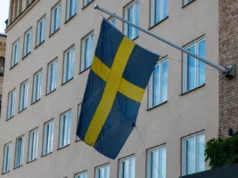Today has been Britain’s darkest day yet in its coronavirus crisis with 786 more fatalities confirmed in the past 24 hours, taking the total death toll to 6,159 victims.

A 23-year-old who had no other known health problems was among those who have died, as well as hundreds of others aged up to 102. In total, 29 people did not have any long-term illnesses before they caught COVID-19.
NHS England confirmed 758 people have died in its hospitals, with authorities in Scotland, Wales and Northern Ireland announcing a further 28 between them.
When counted individually, the four countries have announced 854 deaths today – 758 in England, 74 in Scotland, 19 in Wales, three in Northern Ireland – but the Department of Health’s 5pm cutoff means the official round-up is lower.
Either death toll is considerably larger than the 437 announced yesterday – the combined number is almost twice as high – and marks a new low for Britain in its battle against the epidemic. It has dashed hopes after yesterday’s low figure, the second consecutive fall, suggested the number of fatalities might be starting to level off.
One scientist said the erratic numbers caused by different approaches from the UK’s four governments had become ‘frustrating’. Oxford University’s Professor James Naismith said: ‘The swings in numbers that we are seeing are emotionally draining; hope one day and despair the next.’
There is still hope from today’s statistics, however – only 3,634 people have been diagnosed in the past 24 hours, marking the smallest increase in a week.
Experts say that, as well as different daily record cut-offs, reports are slower to process over the weekend, meaning numbers appear to start declining on Sunday and Monday but then surge again towards the middle of the next week – for this reason it is better not to pin too much significance to a single day’s number.
As the numbers of people dying has increased, so too have the numbers of past deaths which are being rolled into each day’s daily count. Some of the fatalities announced each day actually happened up to 10 days earlier but had not been recorded because of paperwork delays.
Because of this, the true death toll for the UK could be 80 per cent higher than current figures suggest, according to data from the Office for National Statistics, as the number announced on any given day will rise in the coming weeks as more fatalities filter through the system and are backdated.
Today’s statistics come as Prime Minister Boris Johnson remains in intensive care in St Thomas’ Hospital in London after being transferred there last night. His spokesman says, however, that he is in good spirits and breathing on his own. Dominic Raab, the Foreign Secretary, is standing in for Mr Johnson as deputy.
Cabinet minister Michael Gove has been the latest figure at Whitehall to come face-to-face with the virus, today revealing that he was self-isolating for two weeks because a member of his family is ill.
Scientists at the University of Washington have estimated that a shortage of intensive care beds in the UK could see it become the worst affected country in Europe, projecting that there would be 66,000 COVID-19 fatalities. Their study predicted the worst of Britain’s outbreak would happen in the coming weeks, in mid-April.
Public Health England says it has now tested 213,181 people with a total of 266,694 tests carried out – 14,006 were done yesterday on 9,740 people.
London again recorded the most COVID-19 deaths of any region in Britain today, with 224 more people succumbing to the coronavirus.
But other areas of England are being badly affected, too, with Scotland, Wales and and Northern Ireland combined recording fewer deaths (96) than the Midlands (142) or the East of England (101).
In the North West 90 new fatalities were put on record today, along with 88 in the North East & Yorkshire, 77 in the South East and 36 in the South West.
The combined individual figures of devolved countries add up to more than the Department of Health’s total because the Government stops counting at 5pm the day before it announces the numbers. Whereas the other authorities keep going until the next day.
Experts say that, although it is important that the NHS focus on helping sick patients rather than counting them, the approach to statistics is confusing.
Professor Naismith, a biology and statistics expert at the University of Oxford, said: ‘The current methods of reporting mean this daily death toll has value in transparency but it has become unhelpful and distracting in evaluating the progress of the pandemic.
‘The swings in numbers that we are seeing are emotionally draining; hope one day and despair the next.
‘The swings arise for good reasons, the NHS trusts are not focussed on reporting data but on saving lives.
‘Whilst never forgetting the tragedy that these numbers represent, I have put my focus on the trends in the data and hospital admissions as a more helpful guide to our progress than daily totals of announced deaths.’
Dr Joshua Moon, a researcher at the University of Sussex, said: ‘No single day is going to be indicative of a trend. We need a much more long-term view of all of this.
‘Backlogs in reporting and testing, the number of mild or asymptomatic cases that aren’t being tested, and the uncertain quality of the data will highly affect the ability to make decisions on all of this.’
In Spain, officials have admitted that deaths tend to build up over the weekend, get missed from statistics released on Monday, and then surge later in the week.
Figures in the UK show that death numbers tend to dip on Mondays before a spike on Tuesday. Last week, however, the number continued to rise all week from Tuesday onwards.
Spain’s deputy emergency health director, Maria Jose Sierra, insisted Spain was still on the right track despite a rise in the number of deaths and new infections today.
She blamed the increase on an accumulation of cases which had not been reported from the weekend. It is not clear whether the same thing is happening in the UK.
Ms Sierra said: ‘This is due to the weekend adjustment. It is still a downwards tendency.’
Daily Mail

![Late Chinyere Gladys Mbakwe Set For Burial Feb. 20 In Umuahia [SEE POSTER] Mrs. Chinyere Gladys Maduabuchi Mbakwe Set For Burial Feb. 20 In Umuahia [SEE POSTER]](https://abntv.com.ng/wp-content/uploads/2026/02/FB_IMG_1771516412563-238x178.jpg)


![Late Chinyere Gladys Mbakwe Set For Burial Feb. 20 In Umuahia [SEE POSTER] Mrs. Chinyere Gladys Maduabuchi Mbakwe Set For Burial Feb. 20 In Umuahia [SEE POSTER]](https://abntv.com.ng/wp-content/uploads/2026/02/FB_IMG_1771516412563-300x194.jpg)




![Late Chinyere Gladys Mbakwe Set For Burial Feb. 20 In Umuahia [SEE POSTER] Mrs. Chinyere Gladys Maduabuchi Mbakwe Set For Burial Feb. 20 In Umuahia [SEE POSTER]](https://abntv.com.ng/wp-content/uploads/2026/02/FB_IMG_1771516412563-100x75.jpg)